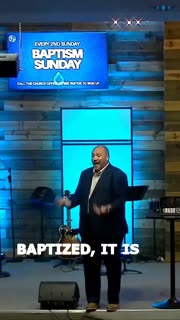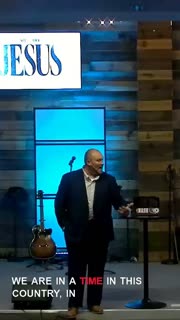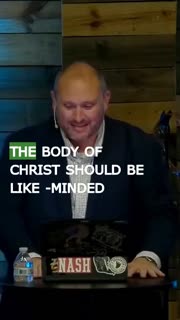Embracing Unity and Humility in the Church
Devotional
Sermon Summary
Bible Study Guide
Sermon Clips
1. "When you get baptized, it is an expression, the public expression of your faith in Jesus Christ. It is the outward expression of what's already taken place on the inside of you. So I encourage you to bring some people with you, all right? Next week, we're going to baptize folks right here in service. I know in the past, y'all have done it downstairs. We're going to do it in the middle of service next week. We're going to make it part of our worship service next week." [22:37] (25 seconds)
2. "We are in a time in this country, in this world right now, where God wants to move and do something in people's lives. And unless the church is lined up and ready, it's going to be hard for us to fulfill our mission as the church. Amen?" [24:12] (19 seconds)
3. "If we loved the way Jesus loved, there would be a line out our doors of people trying to get in them. As a church, if we love the way that Jesus loved, we couldn't keep folks out of this building on Sunday mornings. Jesus said that people will know you belong to him by the love you show." [30:22] (22 seconds)
4. "We segregate ourselves based on denomination, on color, on political, social, you name it. We segregate ourselves in buildings called churches based on our likes or dislikes. Every Sunday, you can roll down the street and you can find whatever flavor of church you prefer. At the end of the day, if I want to go to a church with a bunch of people that look like me, I can do it." [31:58] (34 seconds)
5. "The body of Christ should be like-minded individuals with the same goal and that is to reach people for Jesus. That's it. But in our human abilities we have managed to make church about us and not God and we have a misguided self-centeredness." [37:46] (21 seconds)
6. "God doesn't come to you and call you based on how great you are. He comes to you and calls you based on your willingness to serve him. That's it. The giftings that he gave you to begin with, they're not yours. And if he so chooses, he can take it away. He called us to serve." [40:52] (21 seconds)
7. "Christianity is not about who's greater or more knowledgeable. It's not about getting on Instagram and showing how good we are, but it is about drawing people to Jesus. Now listen, I think we ought to showcase what we're doing as a church. Don't get me wrong. When we put on an event here at this church and there's 1,500 to 2,000 people that show up, we're going to post pictures of God moving in a community." [43:57] (26 seconds)
8. "We have to stop seeing each other as competition and opponents and look at everyone as members of the body of Christ, brothers and sisters. In John chapter 17, Jesus prays multiple times that his disciples and that the believers would be one. In other words, we've got it messed up, right? He says it over and over. Just because someone doesn't look like you or doesn't sound like you does not mean God is not using them." [48:50] (35 seconds)
9. "We have to come together and quit allowing politics and race and social status and theological stances, divide us from other Christians. I don't care if you speak in tongues and believe in it or if you don't. If you are talking about leading people to Jesus, I can hook up with you and we could do this thing." [53:37] (21 seconds)
10. "We are Christians first. That's our primary identity and anything we value outside of that identity must line up with the word of God and if it doesn't line up with the word of God, it is of no value to me. If we allow politics or our race or our social status or our theological stances to divide us from other Christians, we deny the supremacy of Jesus and we embrace those things as idols." [55:38] (33 seconds)
Ask a question about this sermon
2. "We are in a time in this country, in this world right now, where God wants to move and do something in people's lives. And unless the church is lined up and ready, it's going to be hard for us to fulfill our mission as the church. Amen?" [24:12] (19 seconds)
3. "If we loved the way Jesus loved, there would be a line out our doors of people trying to get in them. As a church, if we love the way that Jesus loved, we couldn't keep folks out of this building on Sunday mornings. Jesus said that people will know you belong to him by the love you show." [30:22] (22 seconds)
4. "We segregate ourselves based on denomination, on color, on political, social, you name it. We segregate ourselves in buildings called churches based on our likes or dislikes. Every Sunday, you can roll down the street and you can find whatever flavor of church you prefer. At the end of the day, if I want to go to a church with a bunch of people that look like me, I can do it." [31:58] (34 seconds)
5. "The body of Christ should be like-minded individuals with the same goal and that is to reach people for Jesus. That's it. But in our human abilities we have managed to make church about us and not God and we have a misguided self-centeredness." [37:46] (21 seconds)
6. "God doesn't come to you and call you based on how great you are. He comes to you and calls you based on your willingness to serve him. That's it. The giftings that he gave you to begin with, they're not yours. And if he so chooses, he can take it away. He called us to serve." [40:52] (21 seconds)
7. "Christianity is not about who's greater or more knowledgeable. It's not about getting on Instagram and showing how good we are, but it is about drawing people to Jesus. Now listen, I think we ought to showcase what we're doing as a church. Don't get me wrong. When we put on an event here at this church and there's 1,500 to 2,000 people that show up, we're going to post pictures of God moving in a community." [43:57] (26 seconds)
8. "We have to stop seeing each other as competition and opponents and look at everyone as members of the body of Christ, brothers and sisters. In John chapter 17, Jesus prays multiple times that his disciples and that the believers would be one. In other words, we've got it messed up, right? He says it over and over. Just because someone doesn't look like you or doesn't sound like you does not mean God is not using them." [48:50] (35 seconds)
9. "We have to come together and quit allowing politics and race and social status and theological stances, divide us from other Christians. I don't care if you speak in tongues and believe in it or if you don't. If you are talking about leading people to Jesus, I can hook up with you and we could do this thing." [53:37] (21 seconds)
10. "We are Christians first. That's our primary identity and anything we value outside of that identity must line up with the word of God and if it doesn't line up with the word of God, it is of no value to me. If we allow politics or our race or our social status or our theological stances to divide us from other Christians, we deny the supremacy of Jesus and we embrace those things as idols." [55:38] (33 seconds)










